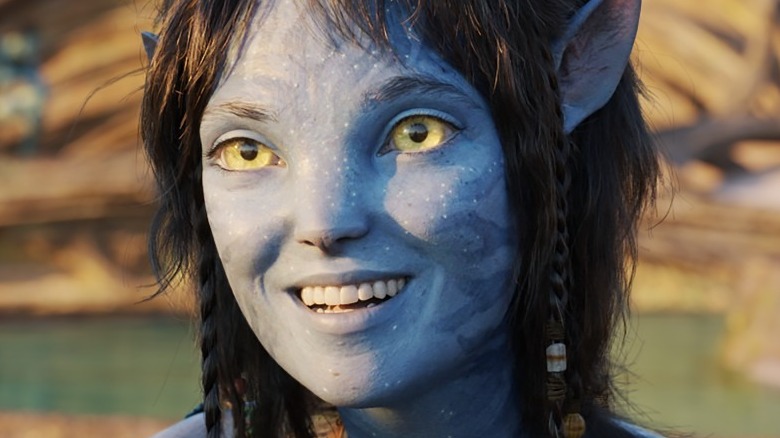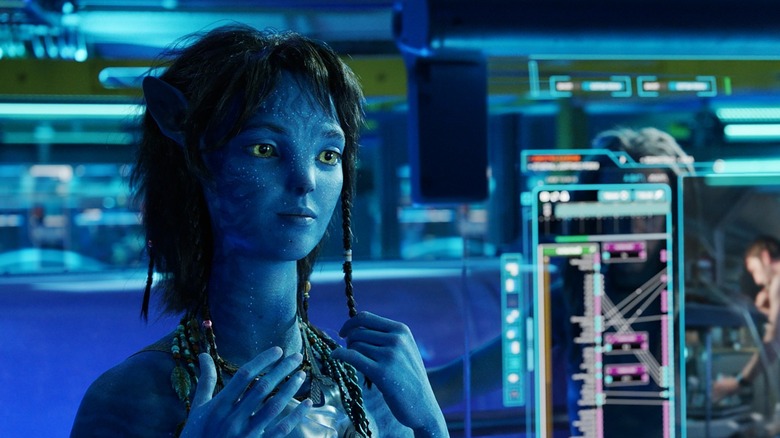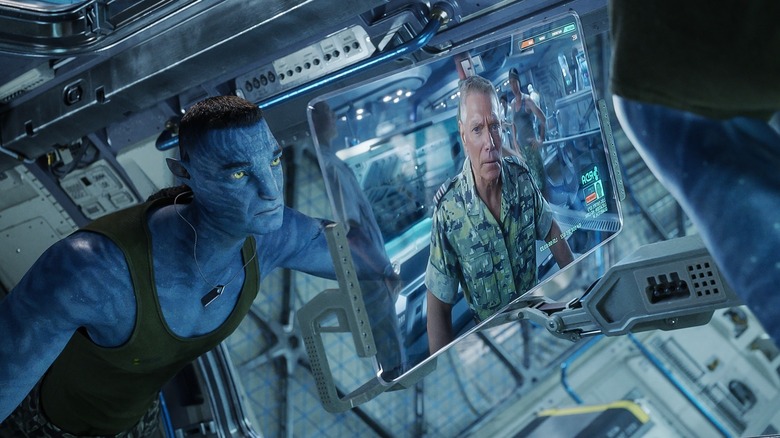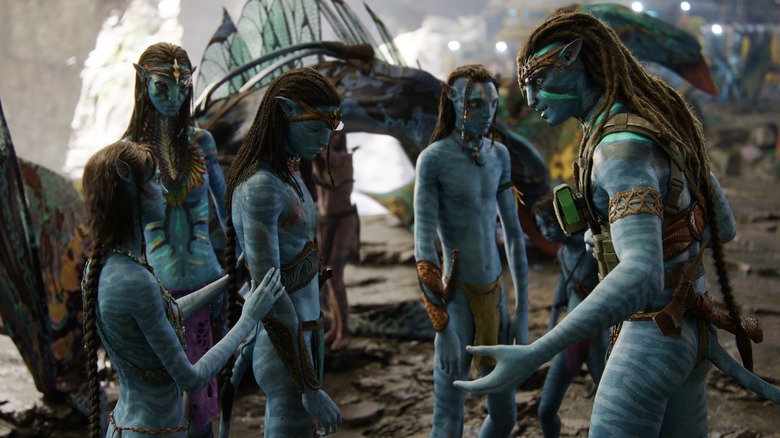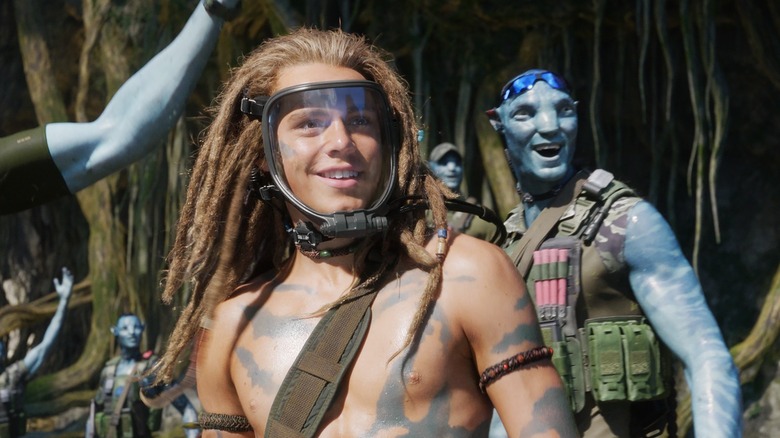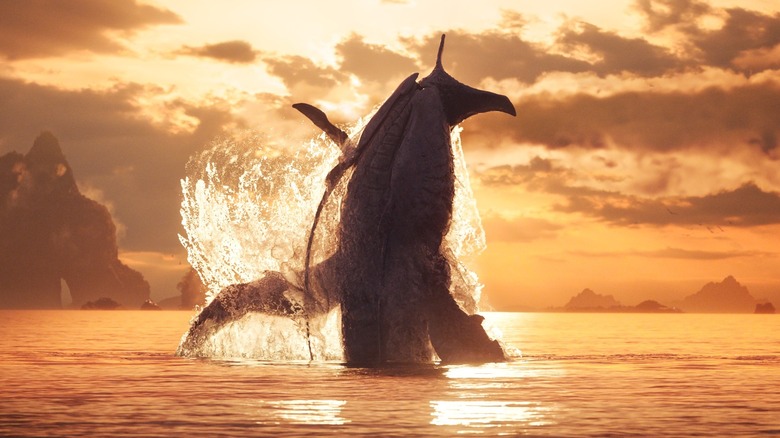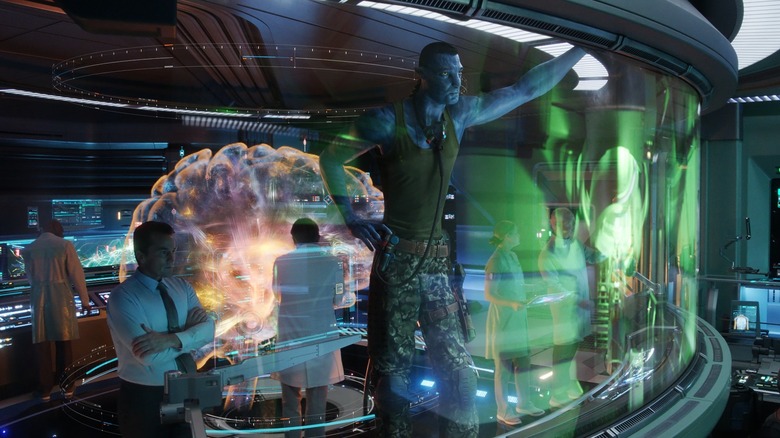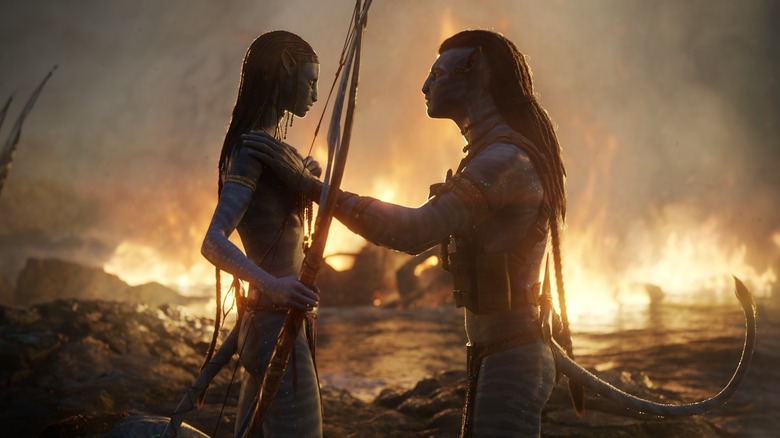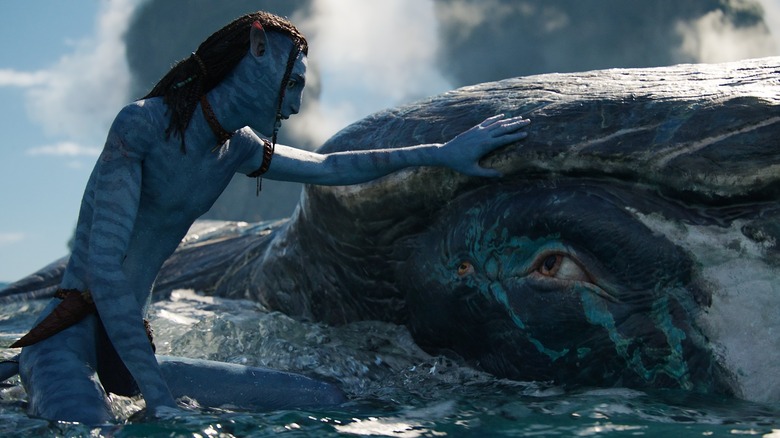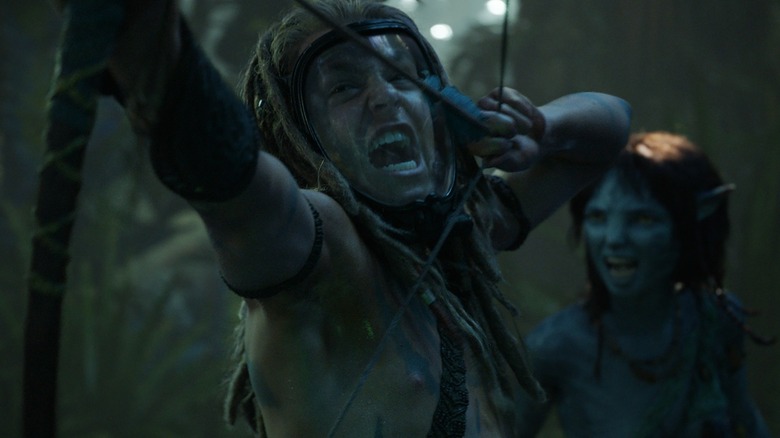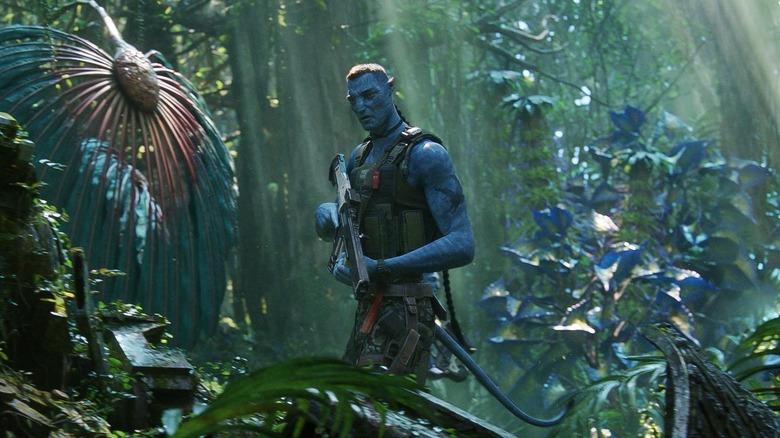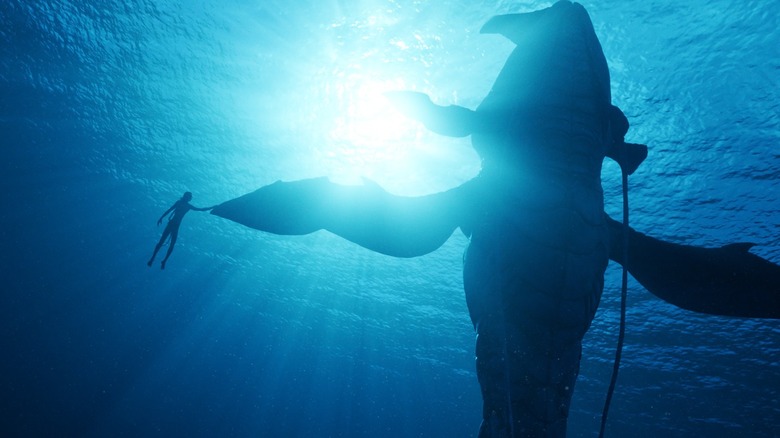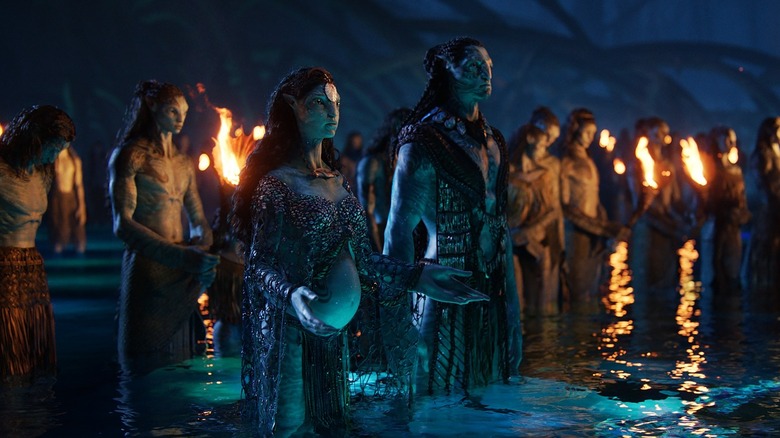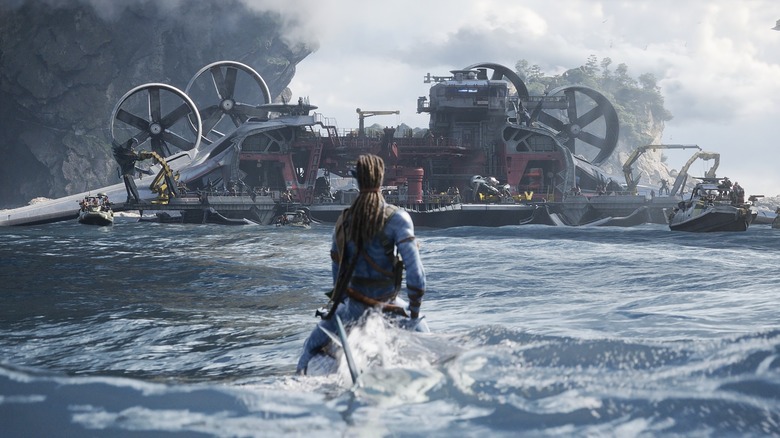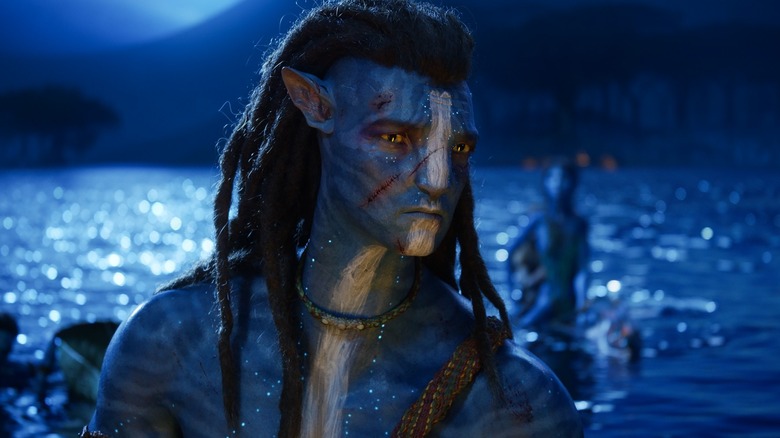Biggest Unanswered Questions In Avatar: The Way Of Water
"Avatar: The Way of Water" is bigger than its predecessor in practically every way. The cast is far larger, the special effects are more spectacular, the world is developed in major ways, and the film itself is about half an hour longer. "Avatar 2" is also far more ambitious in its storytelling. Where the first film tells a pretty rote story about white saviorism and environmental destruction, "The Way of Water" at least attempts far more. It's a story about the power of family, and about the ways we treat different kinds of outsiders. It's still guilty of some of the same problematic writing as the original, but there's at least a lot more substance here to grab onto.
Of course, the risk of introducing so many new things is that you may bring up more questions than answers. In expanding the lore of Pandora and the scope of the overarching "Avatar" narrative, "The Way of Water" leaves some major mysteries on the table. Some of these are clearly teases of what's to come, as James Cameron has at least three more movies already planned. Hopefully that means we'll get answers to all our unanswered questions, but for now, the best we can do is speculate.
Here are the biggest unanswered questions in "Avatar: The Way of Water," some possible answers, and what they could mean for the future of the franchise. Be warned, there will be major spoilers ahead.
Who is Kiri's father?
Perhaps the biggest question in all of "Avatar: The Way of Water" is the one posed in the opening narration: Who is Kiri's (Sigourney Weaver) father? Jake (Sam Worthington) tells us that after the death of Dr. Grace Augustine in the first film, they discover a child growing in the body of her comatose avatar. That child, Kiri, is adopted by the Sullys upon her birth, but her actual origin remains a huge mystery.
Throughout the film, numerous characters — including Kiri herself — speculate as to who her father might be. There are so few compelling answers that even Norm (Joel David Moore) is mentioned as a possible candidate. In reality, no one has any idea who the father could possibly be.
Given that Kiri has strange and powerful abilities and feels so close to the natural world of Pandora that she can "hear Eywa's heartbeat," it's possible that the whole father question is a giant red herring. Consider this: When Grace dies, the Na'vi are trying to move her soul permanently out of her dying human body and into her avatar. The process fails, but before she passes, Grace tells Jake that Eywa is real. Sometime afterwards, the pregnancy is discovered.
Could Kiri actually be a creation of Eywa — the all-seeing goddess of Pandora? It's very possible. While Grace's soul was too weak to survive a transfer into her Avatar, perhaps Eywa is able to put a child in her instead. That would explain the unknown father, Kiri's powers, and why Sigourney Weaver plays both her and Grace. For now, though, we'll just have to wait and see.
Who is Spider's mother?
One of the most interesting new characters in "Avatar: The Way of Water" is Spider (Jack Champion), a human left behind on Pandora when the RDA is sent home because he's just a baby. And as we're told multiple times throughout the movie, you can't put a baby in cryosleep. While there are a few other humans around for Spider's upbringing, he clearly prefers the company of the Na'vi. Like Kiri, he basically becomes a member of the Sully family, and he tries to fit in the best he can by adopting the dress and customs of the Omaticaya. At times, he even paints himself blue.
Perhaps the most interesting thing about Spider, however, is that he's actually the son of the villainous Colonel Quaritch (Stephen Lang). This causes a good deal of drama when Spider is captured by Quaritch and his cronies, but we never learn who his mother was. Since Spider is just a baby when the humans are sent back to Earth, he would have been born on Pandora shortly before the events of the original film. That means that his mother would have been part of the RDA crew.
So where is she? Was she sent back to Earth with the rest of the RDA? And what was the nature of her relationship with Quaritch? For now, those questions remain unanswered.
What happens to the Omaticaya?
At the beginning of "Avatar: The Way of Water," the Sullys are still living with the Omaticaya in the forest. Neytiri (Zoe Saldaña) has stepped up into her late father's role as the clan's protector, and her mother Mo'at (CCH Pounder) remains their spiritual leader. The community is torn asunder, however, when Quaritch returns with a squad of avatar hitmen, all of whom have been sent to wipe the Sullys out.
We don't get to spend that long with the Omaticaya before Jake and his family leave to join the Metkayina. After their departure, we never go back. This leaves the fate of the clan completely uncertain, though there are some clues as to what might be going on back in the forest.
We're told early on that the clan's mountain hideaway is basically inaccessible to ordinary humans. Quaritch is able to sneak in because he's in an avatar, so with him and his squad gone to hunt Jake, the Omaticaya should be pretty safe. This theory is further supported by Norm's visit later in the film. Since he's still stationed with the Omaticaya in the forest, you'd think he'd mention if anything truly terrible were happening.
Of course, the main RDA force is still on the Omaticaya's doorstep. General Ardmore (Edie Falco) is prepping for full colonization of the planet, and the hunt for unobtainium is presumably still active. With all that brewing and Hometree already destroyed, the Omaticaya may not be so safe for much longer.
Why does Spider help the humans?
Spider gets captured by the RDA pretty early on in "Avatar 2." He spends the majority of the film in their captivity, primarily as a part of his father's hunting party. While he clearly despises his captors and rejoins the Sullys as soon as possible, Spider also seems oddly helpful to the humans at times. In particular, he guides them to the hidden home of the mountain banshees, allowing Quaritch's squad to acquire mounts.
Why would Spider help his sworn enemies in this way? It's possible that the humans already know about the banshee nest from Jake's own spying in the first film. Also, Spider's only alternative seems to be an absolutely brutal form of brain-scanning torture, which looks like it might have killed him if he'd been subjected to much more. He does resist helping the recoms on the reefs when they start burning Na'vi villages, so the best explanation is simply that the poor kid doesn't have any other choice.
However, things aren't quite so simple. When Quaritch successfully claims his banshee, Spider looks excited. He smiles at the sight of his father soaring through the sky. Simply put, this makes no sense. Spider has always wanted to be a Na'vi, and he completely despises his father. So why isn't he enraged to see Quaritch successfully bond with a mount? The villain of the story getting to do something spectacular that Spider never can should be a moment of outrage and indignation. Unfortunately, we don't get enough reflection on this moment to fully understand what's going on.
What causes Kiri's seizure?
It's no secret that Kiri is different than the other Na'vi on Pandora. She has an uncanny ability to influence whatever natural forces are around her. Fish, grass, trees, birds — all these and more seem to bend to her will. It's as if the very energy of Pandora flows through her and into everything around her.
This makes it even more curious when, after bonding with the Metkayina's underwater spirit tree, Kiri has a massive seizure. During the bond, she has a vision of her mother and asks her questions about her father. But just as Grace is about to answer, she's yanked away, and Kiri's body starts to convulse.
Norm claims that the seizure is the result of epilepsy, and that the tree triggered hallucinations via electrical impulses in Kiri's brain. But this is Pandora, and nothing is ever that simple. The spirit tree is supposed to be a strong link to Eywa, so maybe it's that connection that causes the seizure. Kiri seems to be a conduit for the power of the planet, so linking with it in such a strong way may have overloaded her.
Of course, it seems impossible that this would be Kiri's first time bonding with a spirit tree. With the Metkayina's specific spirit tree, sure, but we know that "first communion" with the Omaticaya's Tree of Souls is a rite of passage. What was different this time?
What's happening on Earth?
Throughout the original "Avatar" and its sequel, we only get hints at what life is like on Earth. From what is revealed, though, it doesn't sound good. Jake says in the first film that there's "no green" left on his homeworld, and General Ardmore says that the Earth is dying during "Avatar 2." The plans for a colonized Pandora show how extreme things must be on Earth, with humanity soon intending to leave the planet for good. However, we still haven't gotten a real look at what things are like back home.
Extraneous sources like the mobile game "Avatar: Pandora Rising" and the official companion book "Avatar: An Activist Survival Guide" offer a few more details. Corporate dominance, environmental devastation, and constant warfare have effectively decimated Earth's natural ecosystem by the time the films take place. We also know from a handful of lines that classism is rampant. The super-rich can afford miraculous surgeries and eternal youth with enough money, while the masses are left to fight for survival on the planet's desolate husk.
Going back to Earth seems counterintuitive to what the "Avatar" movies excel at, which is showing gorgeous alien locales and exotic animals. Still, a trip home and closer look at Earth seem inevitable as the story moves forward.
What's the RDA's actual plan?
When Quaritch returns to Pandora at the beginning of "Avatar: The Way of Water," he's quickly brought up to speed by General Ardmore. She informs him that the RDA's main objective now is no longer the mining of unobtainium, but the preparation of Pandora for full human colonization. With the Earth rapidly dying, Pandora looks to be the best chance humanity has for a new home. Of course, that also means ripping the planet away from its rightful inhabitants, decimating its natural landscape, and being completely vile in basically every way.
The odd thing is that, later in the film, we see another, very different part of the RDA's operations — the hunting of the Tulkun. The hyper-intelligent whale-like creatures are valuable for the fluid extracted from their brains, which is said to "stop human aging" completely. Like unobtainium, it's a valuable resource, but not one that would likely benefit the majority of humans on Earth.
The RDA is pretty clearly two-faced, claiming to be fighting for the survival of the species while really using its immense resources to further enrich Earth's elite. Their duplicitous nature raises the question — who would actually get to come to Pandora if it were colonized? The masses? Or just the rich, propped up by their hoarded wealth and a healthy number of Na'vi slaves? Ardmore only has a small role in "The Way of Water," but she'll likely be much more important and villainous in the following films.
When did Payakan's mother die?
One of the main storylines in "Avatar: The Way of Water" is the adorable friendship between Jake and Neytiri's second son Lo'ak (Britain Dalton) and Payakan, an outcast tulkun who saves his life. The tulkun has been ostracized by the rest of his kind due to rejecting their strict policy of pacifism. Specifically, he led an attack on an RDA ship after his mother was killed by humans, leading to the deaths of many other tulkun and Metkayina Na'vi.
It's a tragic story, but the timeline of it is pretty confusing. Humans only return to Pandora a year prior to the events of the film, and as far as we know, the RDA's operations during the first film have nothing to do with the sea. That means that it would have only been a year ago at most that Payakan's mother was killed, but that doesn't really make sense. We see that the tulkun hunters target mothers with young calves because they won't abandon their kids. While never explicitly confirmed, it's implied that's what happened to Payakan's mother. And yet, he's a full-grown adult.
Maybe he was grown when his mother was killed, but that also creates some weird discrepancies. The Metkayina talk about him like he's a legend — someone they grew up hearing stories about. So was tulkun-hunting a thing during the original "Avatar?" Is there something else going on here? Or is this just a plot hole?
Why does Spider save his father?
After a long battle with Jake Sully at the end of "Avatar: The Way of Water," Quaritch is strangled out and left to drown. Of course, the unkillable man makes it out once again, this time saved reluctantly by his son. Spider doesn't seek his father out. In fact, he's actually looking for the other Sullys when he comes upon Quaritch's comatose body. Despite his hatred for the man, he grabs him and carries him to the surface, allowing him to fly to safety on the back of his banshee.
Why does Spider do this? Well, there are a couple of plausible explanations. Just moments prior, he was under the knife of Neytiri, who threatened to kill him if Quaritch didn't release Tuk (Trinity Jo-Li Bliss). In a surprising twist of fate, the villain actually agrees, showing that he does care for his son despite his claims to the contrary. In addition to this recent display of affection, Spider probably just doesn't want to be responsible for his father's death. Leaving him to drown would basically be killing him, and killing your father is a big ask — even if you loathe his guts.
Spider hisses at Quaritch when he's invited to flee with him, choosing instead to rejoin the Sullys. However, he doesn't tell them what he's done. Will Quaritch continue to torment the family, putting blood on Spider's hands? Or will this experience cause him to rethink his heinous ways?
Will Quaritch try to redeem himself?
Quaritch is about as cartoonish as a movie villain can possibly get. Stephen Lang is masterful as the detestable baddie, spewing hateful monologues and cheesy one-liners in the same breath. And yet, despite how over-the-top the character is in his wretchedness, there are hints that he could try to redeem himself.
In his first real conversation with Spider, Quaritch apologizes for being a bad father — something that doesn't even make sense given that he was killed when his son was just a baby. This whole scene is a pretty obvious manipulation, and he even drops the same line he uses on Jake in the original film — "Kid, you've got heart." Spider doesn't buy it, but he chooses to go with Quaritch rather than be subjected to more of the RDA's torture. However, by the end of the movie, there's at least a shred of begrudging loyalty between the two of them.
Calling it love might be a step too far, but there's something there. Maybe Spider's hatred can be the fuel that makes Quaritch reflect on his past actions. Given all the evil he's done, though, full redemption would be a tall task. At the end of "The Way of Water," Quaritch says that he and Spider "aren't even the same species," and that line has more meaning than it may seem. Though he's the one in a Na'vi body, he clearly thinks of himself as human and his son as something else. Nonetheless, he surprises himself and everyone else by actually begging for Spider's life.
Will the tulkun change their ways?
When Payakan leaps out of the water to attack the RDA ship at the end of "Avatar 2," you might think that the rest of the tulkun are close behind them. Sure, they despise violence and killing, but they'll make an exception to defend their home, right? Not exactly. Fortunately, one tulkun proves to be enough, because Payakan's brethren never surface during the final battle. Whether or not they'll change their ways remains to be seen.
To be clear, there can absolutely be a role for nonviolent resistors in instances of oppression. But when the very survival of your species is on the line, that role can be hard to find. Humanity isn't going to stop with a few whales and a little bit of forest; they're coming for the whole planet. And when they do, a whole herd of tulkun could be a valuable weapon in the fight for freedom.
Maybe Payakan can convince his community to break their rules just this once. At the very least, it would be nice to see him readmitted into their ranks.
How does the Metkayina's spirit tree work?
The first "Avatar" doesn't provide a lot of details about how the Tree of Souls actually works, but "The Way of Water" gives us some interesting new clues via the Metkayina's underwater spirit tree. We see multiple characters bond with the tree and have curious visions. However, it's still not entirely clear what they're seeing.
When Kiri bonds with the tree, she sees her mother working in a lab. The two have a conversation that's quickly cut off after Kiri starts asking questions. Grace appears to be yanked away from her, and Kiri starts convulsing from a seizure in the real world. Later, at the end of the movie, Jake and Neytiri bond with the tree and see their son Neteyam. This vision is different from Kiri's because it appears to be a memory — an echo of a moment at the start of the film that shows Jake training Neteyam how to fish. Because Kiri never meets her mother, her vision couldn't possibly be a memory.
What's actually happening here? Are Jake and Neytiri actually communing with their son's spirit? Is Grace's soul still alive in Eywa as a result of how she dies? The spiritual aspects of Pandora may never be fully explained, which isn't a bad thing. But in this case, it would be great to learn a little bit more.
What's next for the RDA?
The Na'vi are able to rid their planet of humans at the end of the original "Avatar," but things aren't so simple in the sequel. The big action climax sees the RDA's whaling ship destroyed, but humanity's operations back in the forest are presumably still going strong. So what's next for the RDA, and how will they respond to the battle on the reefs?
Well, if General Ardmore is to be believed, more human forces are coming — probably a lot more. She says that she's been sent to "tame this frontier," gesturing at Pandora at large. It's to be the new home for humanity if the RDA gets their way, which would surely doom the planet. With the very survival of the species apparently at stake, we've likely only seen a fraction of the military might that's coming. The Na'vi will have a big fight on their hands if the colonization efforts continue to gain steam.
How that fight takes shape, however, remains to be seen. Could humanity create a whole army of avatar soldiers to adapt to Pandora's environment? It seems likely. Could they start plundering the spiritual energy of the planet in addition to its other natural resources? Also a possibility. The future looks grim for the Na'vi, but with a united front, they absolutely still have a chance.
What will the Sullys do now?
Though he's a trained soldier, Jake Sully is running scared for most of "Avatar: The Way of Water." When he realizes how great the danger to his children is, he completely abandons his crusade against the RDA and dedicates all his energy to keeping his family safe. Throughout the film, we see Jake humble himself to the Metkayina, Quaritch, and others in order to protect his own. But by the end, he realizes that isn't going to cut it anymore.
"I can't save my family by running," Jake says in the film's closing narration. This suggests that he's accepted Tonowari's invitation to say with the Metkayina rather than fleeing again. The death of Neteyam has clearly changed Jake's perspective, and he now knows that fighting back is the only way to earn peace. However, he doesn't give us many real clues to his next move.
Staying with the Metkayina could have some benefits for sure, but so could moving on to yet another Na'vi clan. If the RDA is to be fully defeated, Pandora needs to be united. Staying on the move also isn't a bad idea, and it isn't the same as running away. Whatever happens, the Sullys have their work cut out for them, but they seem more than up to the task after "The Way of Water."
